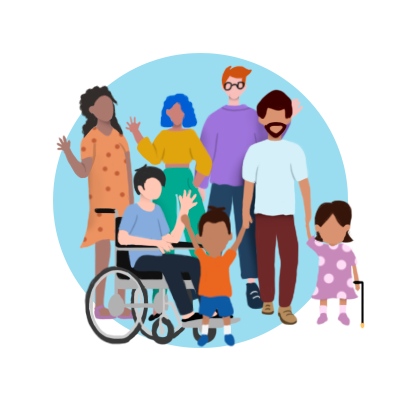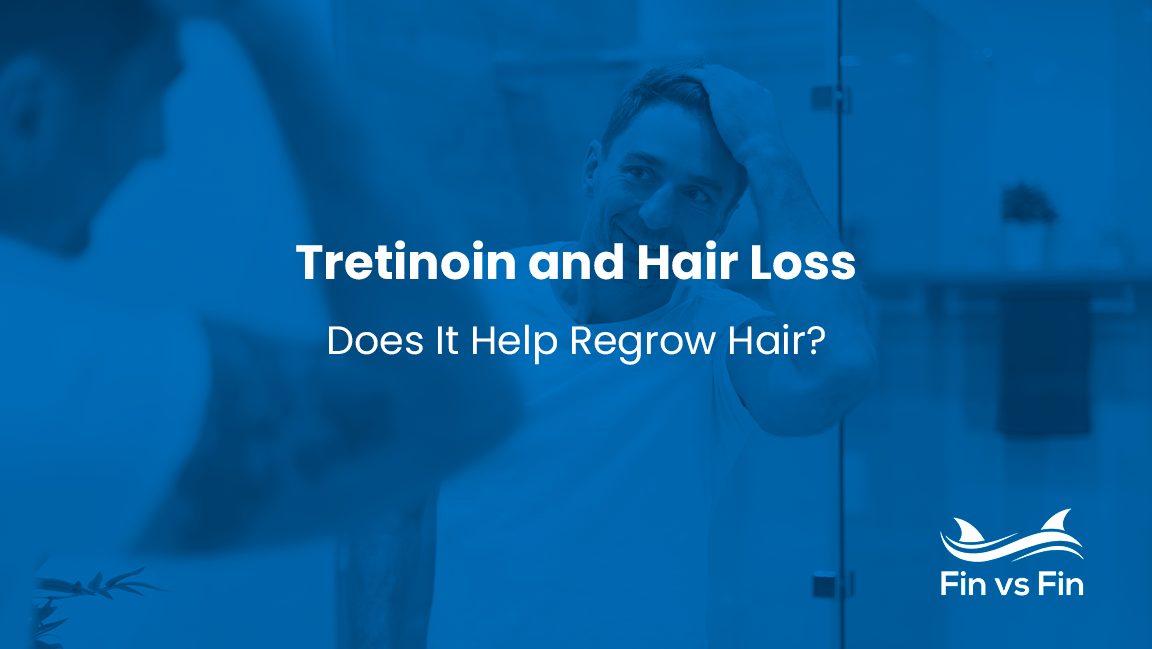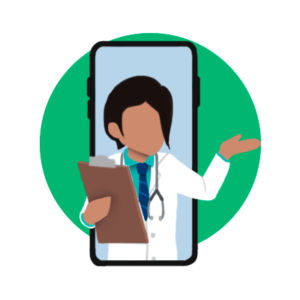- Topical tretinoin may support hair growth by increasing circulation to the scalp and boosting cell turnover.
- Up-to-date clinical research indicates that tretinoin can enhance the effects of minoxidil for hair growth.
- The most common side effects of tretinoin are skin irritation, dryness, and itching.
- Starting with a low concentration and frequency of tretinoin can help prevent side effects and shedding.
Tretinoin, which is sold under the brand name Retin-A, is a topical retinoid medication that’s primarily used to treat acne and skin aging, but may also benefit hair loss. Though research is limited, tretinoin may help regrow scalp and facial hair in some individuals.
While tretinoin’s potential to promote hair growth was confirmed in a 1986 clinical study, more recent research is lacking. However, up-to-date studies have affirmed that tretinoin can enhance the effects of minoxidil, an FDA-approved topical treatment for androgenic alopecia, or pattern hair loss. It’s important to keep in mind that tretinoin may not work well for everyone and can lead to side effects, such as skin irritation, dryness, and more.
In this article, we’ll discuss the effect of topical tretinoin on hair loss and whether you should consider this medication as a standalone treatment, or in addition to minoxidl to regrow hair. We also spoke with Dr. Jonathan Rick, a board-certified dermatologist, about the impact minoxidil can have on hair regrowth.
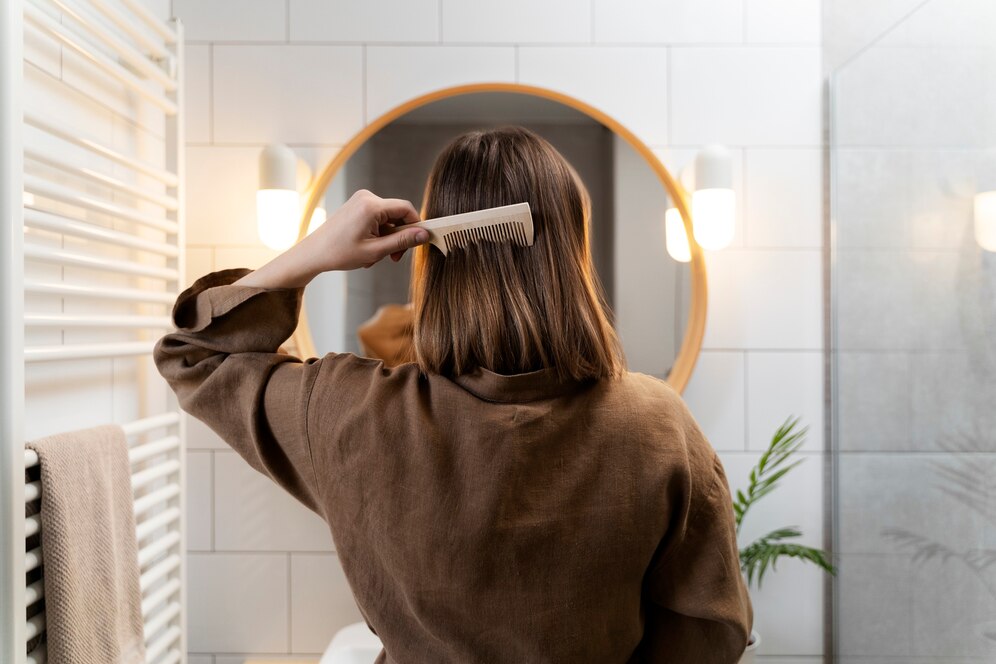
Can Tretinoin Stimulate Hair Growth?
As a retinoid (a form of vitamin A), tretinoin increases cell turnover, stimulates collagen and elastin production, and promotes new blood vessel formation. Tretinoin also has proven anti-inflammatory benefits.
By boosting the formation of new blood vessels, tretinoin is thought to increase circulation to the skin, which may prevent hair loss. Additionally, in increasing cell turnover, this retinoid may promote healthy hair follicle turnover on the scalp and face (in individuals looking to increase facial hair growth).

Research about the effects of tretinoin alone on hair growth is out-of-date. While updates are necessary, a 1986 study published in the Journal of the American Academy of Dermatology found that tretinoin stimulated some hair growth in an estimated 58% of people. This study noted that one assigned female with pronounced alopecia for over 20 years had hair regrowth within 18 months of using only tretinoin.
More recent research on tretinoin for hair growth evaluates topical tretinoin in combination with minoxidil. So, while tretinoin may work alone for hair growth in some individuals, there’s more research to support its benefits as a combination treatment with minoxidil.
Related reading: Best Stem Cell Hair Growth Serums – Do They Really Work?
Tretinoin With Minoxidil for Hair Loss
Various clinical studies have suggested that tretinoin and minoxidil have synergistic effects.
- A 2019 study found that tretinoin improves minoxidil response in people with androgenic alopecia by increasing scalp enzyme activity. It also found that 43% of participants who were predicted non-responders to minoxidil responded to the treatment after 5 days of applying 0.1% tretinoin.
- A 2014 study found that 5% minoxidil with 0.1% tretinoin significantly increased hair growth and hair follicle diameter. However, this study was conducted on mice, and further research involving human subjects is required to confirm the results.
- A 2007 study found that using 0.01% tretinoin with 5% minoxidil may allow people to successfully apply minoxidil just once daily, rather than twice daily, which is typically recommended. This may improve treatment adherence by making minoxidil use more convenient.

With these benefits in mind, there are potential risks of using tretinoin with minoxidil for hair loss. The most common adverse effects of this combination therapy are itching and skin irritation at the application site. Tretinoin can also cause dry skin, which can exacerbate scalp burning and redness from topical minoxidil.
Given the lack of extensive, up-to-date research on tretinoin with minoxidil, it’s difficult to directly compare it to other hair loss treatments. However, it’s worth noting that 5% topical minoxidil can be used alone, as it’s FDA-approved and widely supported by clinical research as a safe, effective treatment for androgenic alopecia.
Tretinoin with minoxidil may work best for individuals who aren’t satisfied by the results of minoxidil alone.

A Word From Our Expert
— Dr. Jonathan Rick
Topical minoxidil is a cost-effective treatment for several types of hair loss. This was initially sold as Rogaine, but there are several generic alternatives on the market now. There is a wealth of data and experience showing that this is an effective product, especially for androgenic alopecia, or pattern hair loss.”
Related reading: How to Get Oral Minoxidil Online – A Complete Guide
Does Tretinoin Cause Hair Loss?
There’s no significant clinical research indicating that tretinoin causes hair loss. However, anecdotal evidence shows that regular tretinoin use causes hair loss or thinning in some individuals and hair growth on bald patches and facial hair in others.
A 2005 study in the Journal of Investigative Dermatology found that substantial diffuse hair loss (shedding from all areas of the scalp) is a common side effect in people taking oral synthetic retinoids. Tretinoin is classified as a synthetic retinoid. However, hair loss isn’t a reported side effect of topical tretinoin.
Related reading: Does Vaping Cause Hair Loss?
How to Use Tretinoin for Hair Loss
To use tretinoin for hair loss, ensure that you use a topical, not oral, formulation. Tretinoin is only available with a prescription, so you’ll need to talk to a dermatologist before using this medication. Your dermatologist will likely start you on a low concentration and frequency (i.e. every two to three days) to prevent scalp dryness and related side effects.
Use your tretinoin prescription as advised by your dermatologist. You can also follow these tips:
- Gently cleanse your scalp and/or hairline before applying tretinoin.
- Make sure the treatment area is completely dry before applying tretinoin, as applying it to wet skin can cause irritation.
- Apply a layer of moisturizer to the skin before applying tretinoin to prevent irritation while your skin adjusts to the medication.
- Apply only a small, pea-sized amount. Excessive tretinoin can increase the risk of side effects.
- Apply tretinoin at least 20 minutes before bedtime. This allows it to absorb completely, rather than transferring to your pillowcase.
- To apply tretinoin to the scalp, separate your hair to reveal areas of the scalp. Repeat with different sections of hair until you’ve covered the entire treatment area.
- To apply tretinoin to the hairline, simply spread a thin layer of the medication on the hairline.
- Use tretinoin consistently (unless you experience side effects), as it may take up to three months to notice results.
Tretinoin increases the skin’s sensitivity to the sun. Wear a hat and apply SPF 30 or higher to limit sun exposure while you’re using tretinoin. Reach out to your healthcare provider if you have additional questions or concerns.
Related reading: How to Get Prescription Tretinoin Online
How Often to Use Tretinoin for Hair Growth
The optimal frequency of use for tretinoin depends on the strength of your prescription. Dermatologists generally recommend using tretinoin every other day or every two days, especially to start. As your skin becomes accustomed to tretinoin, you may increase the frequency (with your dermatologist’s approval).
Clinical studies have shown that 0.01% topical tretinoin combined with 5% minoxidil is effective for hair growth when applied daily. This is a very low concentration of tretinoin, which helps reduce the risk of side effects.
Should You Apply Minoxidil Before or After Tretinoin?
It doesn’t matter if you apply minoxidil before or after tretinoin. The medications can be applied in any order, but should be applied to dry, clean skin.
Safety and Side Effects of Tretinoin
Topical tretinoin is generally regarded as safe when used as advised. While some individuals have raised concerns about vitamin A toxicity from topical tretinoin for hair health, the amount of tretinoin that’s absorbed through the skin into the bloodstream is minimal. This means that topical tretinoin is unlikely to cause systemic side effects.
With this in mind, topical tretinoin can cause localized side effects, including:
- Redness
- Scaling
- Dry skin
- Peeling
- Skin pain
- Burning or stinging of the skin
- Lightened or darkened skin
- Warmth or mild stinging of the skin
- Swelling of the skin
- Blistering or crusting of the skin
Does Tretinoin Affect Hormones?
Limited clinical research has indicated that tretinoin may affect hormone levels. A 1998 study found that retinoic acid reduced testosterone levels and increased progesterone levels in rats, while a 2019 study linked retinol to higher levels of testosterone and estrogen in adults assigned female at birth.
Topical tretinoin is unlikely to affect hormone levels, as very little of it is absorbed through the skin and into the bloodstream. However, further research is required to confirm this.
Who Should Avoid Tretinoin?
Individuals who are pregnant should avoid tretinoin, as it can increase the risk of birth defects. Additionally, people with scalp conditions (like seborrheic dermatitis) should avoid applying tretinoin to the scalp, as it may exacerbate scalp peeling, flaking, and itching.
Seek emergency medical care if you experience:
- Hives
- Severe skin irritation, pain, peeling, or blistering
- Symptoms of a severe allergic reaction, such as dizziness, nausea, shortness of breath, swelling, and more
Summary
Topical tretinoin may help stimulate hair growth by boosting circulation to the scalp and increasing cell turnover, however, research is limited. More significant clinical research indicates that tretinoin enhances the benefits of topical minoxidil for hair regrowth. Combination therapy with tretinoin and minoxidil may help people who aren’t satisfied with the results of minoxidil alone for hair growth.
The most common side effects of tretinoin include skin dryness, itchiness, and irritation. You can prevent these side effects by starting with a low concentration of tretinoin and only applying it every 2 to 3 days.
If you think tretinoin for hair loss could work for you, schedule a consultation with a licensed dermatologist to see if you qualify for a prescription.
Frequently Asked Questions (FAQs)
What are the cons of tretinoin?
The main con of tretinoin for hair loss is that it can cause dry skin and skin irritation. It’s also only available with a prescription and may be expensive for individuals without insurance.
Is retinol a DHT blocker?
Retinol isn’t a known DHT blocker.
How long does it take for tretinoin to work?
Tretinoin typically takes 1 to 3 months to work.
Is it okay to use tretinoin every night?
It may be okay to use tretinoin every night if you don’t experience skin irritation or dryness. Be sure to follow your healthcare provider’s specific medication instructions and reach out if you have further questions.
Does topical tretinoin affect the liver?
No clinical research has found that topical tretinoin affects the liver. However, oral tretinoin may impact the liver’s function.
Related Reading
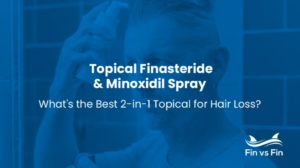
Topical Finasteride and Minoxidil Spray Review – What’s the Best 2-in-1 Topical for Hair Loss?
If you’ve been looking into treatment for pattern hair loss (androgenic alopecia), you may have come across the ingredients minoxidil and finasteride, which are the two most popular and clinically-backed treatments for thinning hair that come in both oral and topical form. Brands like Hims,
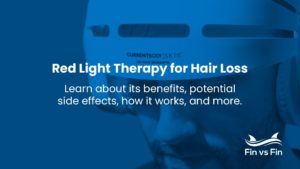
Red Light Therapy for Hair Loss: Does It Promote ReGrowth?
Key Takeaways Red light therapy can safely and effectively treat hair loss in some individuals. It typically takes four to six months to see results from red light therapy. Red light therapy can promote regrowth and hair retention. While many types of red light therapy

Hers vs. Rogaine vs. Nutrafol: Which Is Best for Hair Loss?
Our Top Picks Best for Comprehensive Hair Care: Hers, Amazon | Jump to Review Best for Convenient Accessibility: Rogaine, Amazon | Jump to Review Best for Natural Ingredients: Nutrafol, Amazon | Jump to Review Hers, Rogaine, and Nutrafol are all brands that offer hair loss treatments

How to Get Oral Minoxidil Online: A Complete Guide
Key Takeaways Oral minoxidil is a good option for individuals with androgenic alopecia who experience side effects from topical minoxidil or who are not seeing the results they hoped for. You can get an oral minoxidil prescription online by completing a virtual consultation with a

Does High Blood Pressure Cause Hair Loss?
Key Takeaways While some studies do show a potential association between high blood pressure and hair loss, more research is still needed. High blood pressure can affect blood flow, potentially impacting blood flow to the scalp and hair follicles. Some medications used to treat high
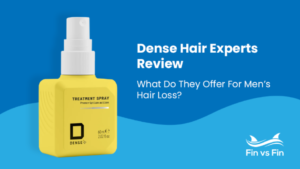
Dense Hair Experts Review: What Do They Offer for Men’s Hair Loss?
Dense Hair Experts Overview Price: £59.99 (or £47.99 on subscription) Prescription products: Finasteride, dutasteride OTC products: Minoxidil, shampoo, conditioner, vitamins, styling products Active ingredients: Finasteride, dutasteride, minoxidil Potential side effects: Itching, redness, flaking Who it’s best for: Individuals experiencing male pattern baldness Go to Site→



